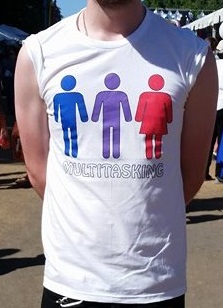One of the most popular bisexual t-shirts I’ve seen (not one of mine) features the words “Nobody knows I’m bisexual.” The design, and its popularity, speak to a crucial issue for the bisexual community: lack of visibility. I’ve written about it before, and with Pride 2017 coming up I wanted to draw attention to it again. When people are able to identity as bisexual, both to themselves and to others, it has a significant impact on their own emotional health and on the community as a whole.
When we distance ourselves from our sexual identity, we’re hiding a valuable piece of ourselves and that takes a toll on us. In one of the most powerful TED talks I’ve seen, Ash Beckham likens it to holding a grenade. Self-erasure is a disease in the bi community, metaphorically, and I am 100% confident that it contributes to the real physical and mental health issues that are sadly so common to people of our sexuality. Add in the bisexual erasure we face from people of other sexualities, and the results are catastrophic. So what can you do to help fix this?
The first step is owning your own sexuality. Yes, bisexuality is “normal.” No, you don’t have to pick a side. No, it’s not just a phase. (Although for some people it might be, as sexuality can be fluid over time.) No, you don’t have to have had sexual experiences with any gender to know you’re bisexual! It helps to learn about bisexuality and do some self-exploration to determine how you identify. Are you bisexual/heteroromantic? Or biromantic/heterosexual? Or maybe biromantic/asexual? The more you know, the better communication you can have with your sexual and romantic partners. (Some of this will come over time as you have more sexual and romantic partners.) Overall, the more you understand accept your own identity, the more others can understand it and join you in celebrating it.
The next hurdle is being open about your bisexual identity with others. The tricky thing with bisexuality is that it can be easy for others to automatically, incorrectly identify you as gay or straight. I personally fight this by finding ways to reveal my identity. Sometimes I come straight out and tell people I’m bisexual (yes, sometimes it just comes up in conversation.) Other times I find ways to mention an ex and use female pronouns when talking about her. And of course I can always wear one of my shirts – they are always conversation starters and some are more subtle than others.
I choose my battles. I don’t reveal my identity to people who I know might have issues with it. Maybe someday I will, but not yet. But here’s the cool thing: when people figure out or find out that I’m bisexual, an amazing thing often happens. They reveal their own sexual identity to me, or share some experiences they have had. Straight people often ask the best questions about my bisexuality and polyamory and how my relationships work. When I learn that friends and acquaintances are bisexual, I always come out to them in return. It helps to know that you are not alone, and that you have a community to rely on for support.
Some people aren’t able to be out as bisexual, and that’s ok. Others don’t like the label bisexual. That’s fine too. What I’m asking is this: if you’re able, embrace your bisexual identity.
Don’t do it for LGTQA folks. Don’t do it for straight folks. Do it for the young bi kid who has never known a bisexual person. Do it to benefit the bisexual community as a whole. And most importantly, do it for yourself and embrace your bisexual identity.



